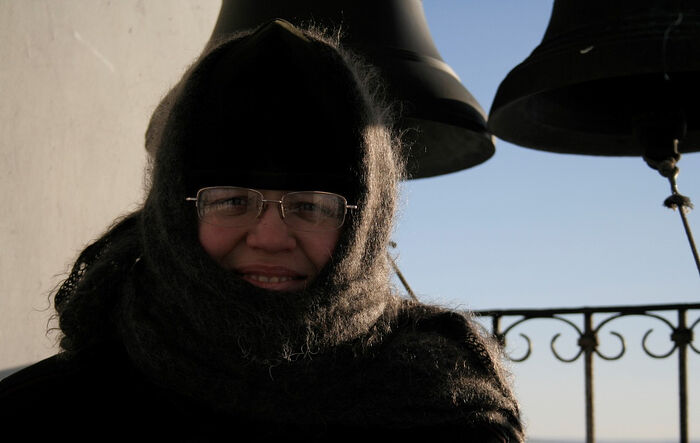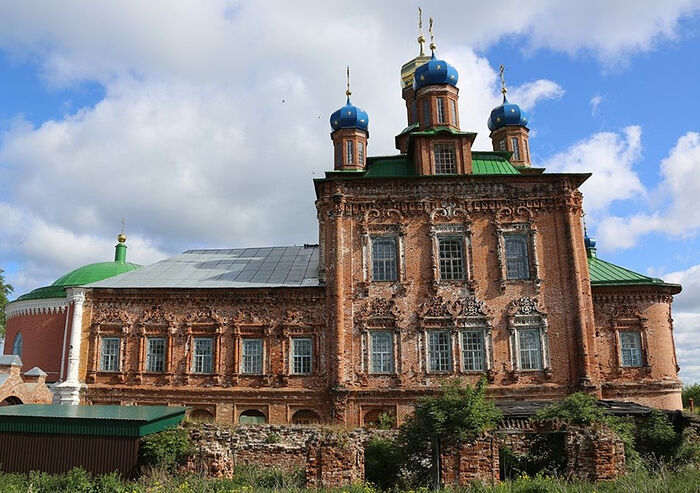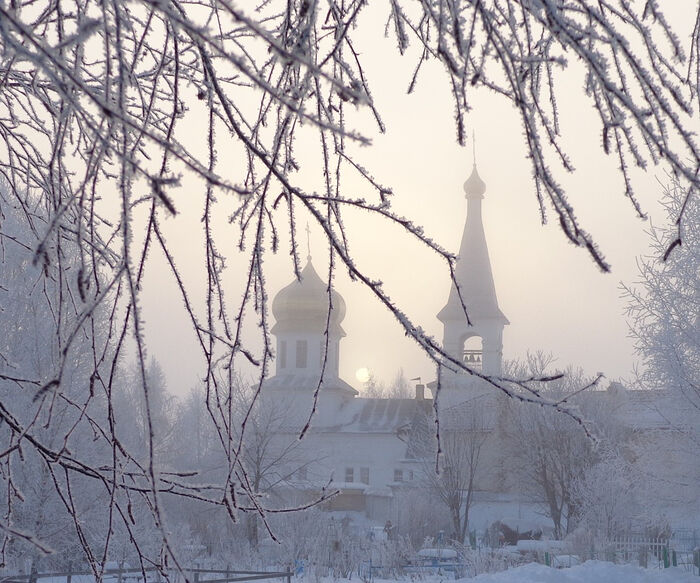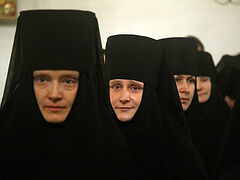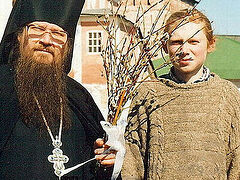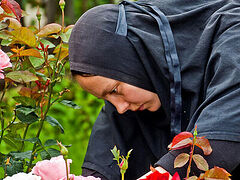From the author: Many of my stories (“Encounter With the Invisible World,” “Athonite Stories From Fr. Savvaty,” “A Short Story about the Short Life of Slava the Czech,” and others) were written based on the stories from the sisters of the Kazan-St. Tryphon Hermitage and its spiritual father Igumen Savvaty (Rudakov). Today I’d like to acquaint you, dear readers, with the Nativity stories of the sisters of this monastery.
How I went to the monastery on Christmas
Stories of Nun Christina (Sheveleva)
My childhood
I was born in 1976, and like most Soviet schoolchildren, I grew up without faith in God and was even unbaptized. I came to Baptism on my own as an adult, and then everything in my life completely changed. Let me start from the beginning.
My brother and I grew up in a warm family. Our parents really loved us, trusted us, and gave us complete freedom in almost everything. We didn’t abuse this freedom, we studied well, and we thought everything in our life was going right.
In school, I was certain that God “of course” didn’t exist, and I proudly wore a Pioneers’ tie1. I grew up as a lively, cheerful child, and in class I liked to turn around and chat with my classmates, but despite our antics, I studied well and always got good grades. One of my classmates wasn’t as good at school, and when I found out she was wearing a cross, I even told her that only fools wear crosses. I’m still ashamed of these words.
But apparently my great grandparents were praying for me and my family. My parents didn’t mention that they were deeply believing people, and I found out about it much later. It turns out that my father’s grandfather was even a churchwarden in the village of Enidor, beyond Cherdyn. My grandmother, who survived the war, famine, and the death of her husband in the war, was also a believer.
Worldly joys didn’t satisfy my soul
In eleventh grade, before graduation (this was 1993), we already knew about the state’s “warming” to the Church, and my teacher took our class to the ruined church in the village of Usolye, near Berezniki. I went along with everyone, but when we reached the church, I didn’t even get off the bus: I wasn’t interested in anything about the Church then. It was as if non-existent, closed to me.
I had many interests. Besides school, I went to the pool, to various clubs, including dance, and theater. But, despite being cheerful and noisy myself, I nevertheless always felt somehow detached from the cheerful and noisy life that was beating around me. It was if Someone Unseen was leading me by His hand away from friends that were too uninhibited, casual acquaintances, unnecessary interests, and even from people I really liked.
At some point in communicating with friends, I began to feel something strange: I wanted to be with them, but at the same time, I felt my detachment, otherness. Worldly joys didn’t satisfy my soul; I wanted something more, something else, but I didn’t know what at that time. This dichotomy confused me, and I went to study psychology to find and eliminate the cause of my misunderstanding of this world and myself.
I studied and worked part-time so as not to burden my parents too much. I made more friends and acquaintances, including friends of my brother, who was a musician. There were always fun groups of people gathering in our apartment, but I still kept aloof: The fun of these friendly parties didn’t fulfill me; it was superficial, and dissipated in the morning like fog, leaving no trace.
They had many psychological training courses at the institute, but I didn’t find any answers to my questions about the meaning of life. What is the meaning? I became more and more convinced that I didn’t want what the people around me dreamed of, but I didn’t know what my soul was yearning for.
Towards the end of my studies at the institute, I was attacked by a strong case of melancholy. It seized me so strongly that I stopped consoling myself by communicating with people and getting together with friends. Even buying new things didn’t please me, but made me feel empty, and I wept because I couldn’t enjoy the goods of this world as others do—it doesn’t bring me total joy.
This church was, like me, at a dead end
One weekday, I found myself near a church for work. It stood on the outskirts of the city. Public transportation didn’t go there. There was a potassium plant nearby, and it was basically a dead end. The church was, like me, lonely, among dissimilar buildings, garages, and walls with barbed wire around the factory. This church was, like me, at a dead end. And I went in.
I didn’t know how to behave, and I asked what to do if, for example, my grandmother died. They said to light a candle on the panikhida table and pray for the repose of her soul. I went up to the table with a candle, and tears unexpectedly started gushing from my eyes. I didn’t understand why, but these tears strangely relieved the sorrow of my soul, calmed me down, and I stood there for a long time without any thoughts, weeping. As I left the church, I felt some cold fetters falling from my heart. And again, it was all incomprehensible to me.
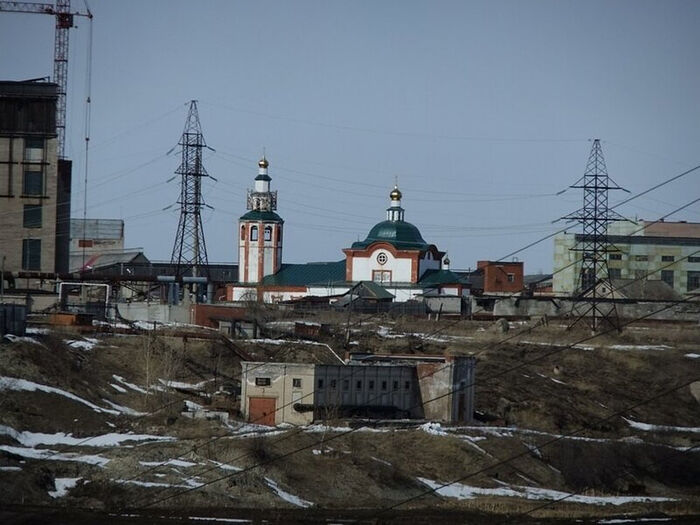 The church in Berezniki among the factories
The church in Berezniki among the factories
How I decided to be baptized
My mother was taken aback by my desire to be baptized, but I was already twenty-four, plus she was used to giving my brother and I freedom, and therefore, she didn’t say anything against it.
There was a problem about what to wear to church. I didn’t like skirts. I only had jeans and a few t-shirts in my dresser. I had to wear my mother’s clothes, which made me feel like a village grandma, and I was afraid to look at myself in the mirror. I thought if I looked, maybe I’d change my mind about going to the church. Hiding from the view of others, I went to my Baptism.
About ten people came to the Sacrament. The young priest, Fr. Alexei Prokhorov, said that it’s better not to go to church just three times in our lives—at our Baptism, wedding, and funeral, but we also have to read spiritual books, learn about God, and come to the services. I was touched by his words.
After the Baptism, I stayed in the church. I wanted to take a closer look at the icons. Then suddenly the priest came out with the chalice and offered to commune the newly baptized if we had come on an empty stomach. Out of all of them, only I had fasted, and I approached the holy chalice.
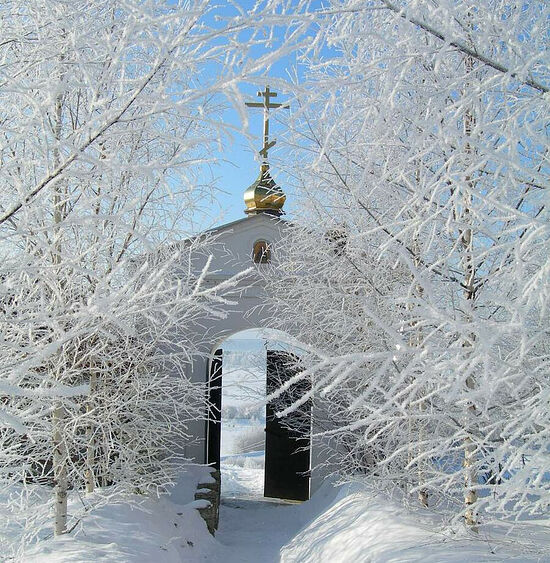 In the Kazan-St. Tryphon Hermitage
In the Kazan-St. Tryphon Hermitage
I felt like I was in a Christmas story
After my Baptism and Communion, everything around me suddenly changed in a strange way. Some miracles began to happen. It felt like I had fallen into some Christmas story, and I still keep this in my heart, as though it all happened just yesterday.
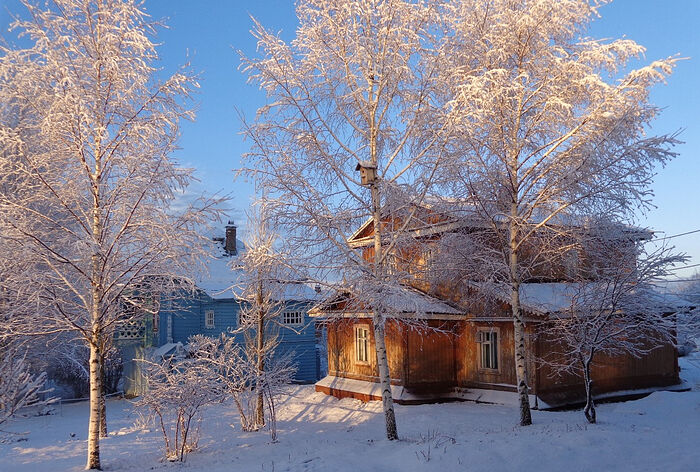 A beautiful winter at the Kazan-St. Tryphon Hermitage
A beautiful winter at the Kazan-St. Tryphon Hermitage
It was like I was in a different—better—world. Absolutely wonderful things were happening: First, I suddenly didn’t care about what I was wearing—I forgot I was wearing a hated skirt and old woman’s head scarf.
Second, when I got on the bus, I realized I couldn’t tell men and women apart: They all merged into the same beautiful images, like one person. I looked around, looking at their faces, to no avail—I didn’t see any difference. I thought I’d definitely be able to tell by the voice if it were a man or woman speaking. There were two people sitting in front of me. I listened to their conversation, and I didn’t understand a word—the speech merged into one beautiful and melodious but indistinguishable sound, and I couldn’t tell who was who. I want to say that because of my stupidity, I thought it was the bit of cahors wine that had such a strange effect on me.
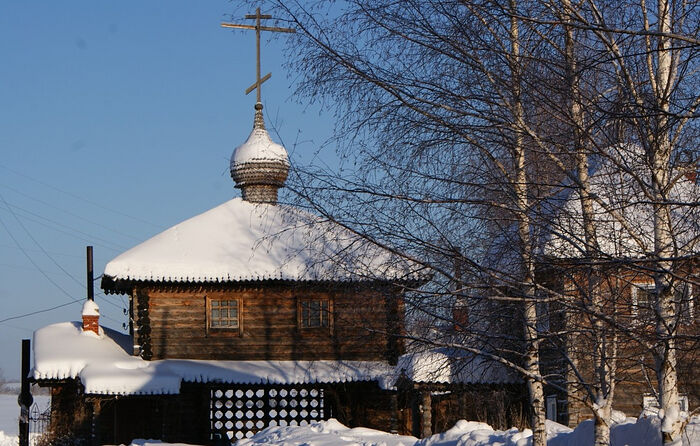 Winter in the Kazan-St. Tryphon Hermitage
Winter in the Kazan-St. Tryphon Hermitage
“You wouldn’t happen to be a nun, would you?”
I was strongly drawn to the church, and I started going to the services both morning and evening. Soon I went to my first Confession. The same Fr. Alexei was hearing confessions. Then he uttered a phrase that was mysterious for me: “You’re already twenty-four, you have to decide whether to get married or to go to a monastery.” I didn’t have a boyfriend, and there was no question of marriage, but I didn’t know anything about monasteries.
And I thought, since the priest said this, then probably I should make friends with some believing young man and start a family out of obedience. Both a monastery and a family were like going into space for me. But mostly only old babas came to the services, and there wasn’t a single believing young man in my circle.
One day at the evening service, during the Magnificat, the old deacon, also named Fr. Alexei, passing by me with the censer, stopped, and looking into my eyes and asked head-on: “You wouldn’t happen to be a nun, would you?” I said no. He didn’t stop there, but continued: “Are you really not a nun?” Again I said no. And he insisted: “You look like one!” and already plaintively asked: “You sure you’re not a nun?”
I look like a nun?! I used to go to church in jeans, there change into a skirt, and then put on jeans again. It was strange for me to hear this then. But for some reason, these words brought a warmth to my soul.
At the deacon’s last question: “Are you sure you’re not a nun?” I started weeping: “What kind of nun am I?! I’m a wolf in sheep’s clothing!” The next day at Liturgy, the deacon brought me from the altar a prosphora with the nine commemorations, used in the services.
Thus, I gradually funneled into the life of the Church, I read spiritual books, watched the parishioners—and, like a little child, I absorbed the atmosphere, which already felt like home to me.
My mother’s fears
I especially remember a conversation with my mother. She didn’t allow us to be baptized in childhood, and I thought, we’ll grow up and we’ll do what we want, but for now—she’s against it. Therefore, I hid from her the fact that I was going to church almost every day. I was also afraid that her reaction would cool my experience of the miracle, and I wasn’t ready for that. But a month later, when I already understood that it was quite serious for me, I decided to confess.
With agitation and trembling in her voice, my mother said that she had been noticing changes in me for a long time, and that I always smelled like incense. She started trying to dissuade me from going to church so often. But I had found the most precious thing in life—Christ. And that’s why I took my mother’s words as an attempt to deprive me of the most precious thing. The conversation was hard for both of us. Her suspicions had turned into facts, and it was scary for her—very scary, I think.
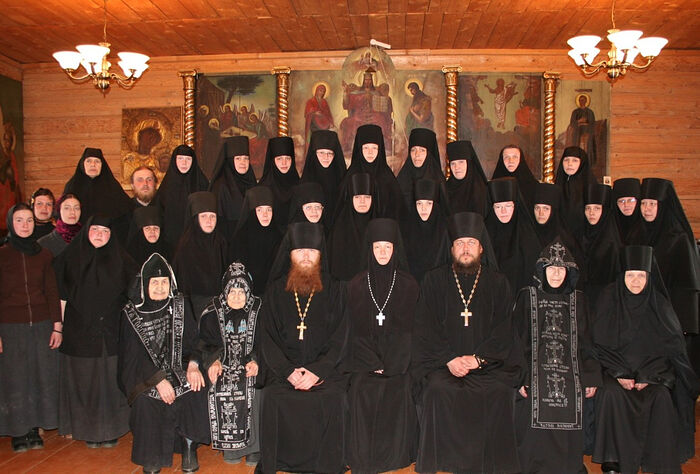 The sisters and priests of the Kazan-St. Tryphon Hermitage
The sisters and priests of the Kazan-St. Tryphon Hermitage
To be continued…

